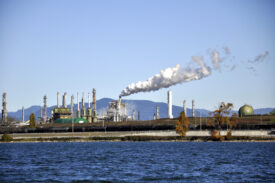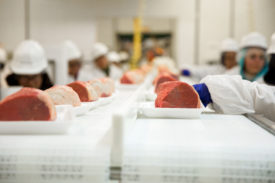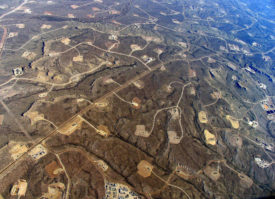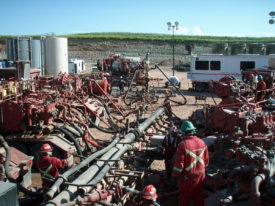Eric dP:
Joel Connelly deserves many kudos for being the first to draw attention to the fact that Tim Eyman’s proposed latest “two-third majority” anti-tax ballot measure is really just a stalking horse for Big Oil. You can tell, as Connelly points out, because oil refiners have already thrown a staggering $350,000 behind his initiative.
I really think it’s worth being clear about this: tax policy in Washington State is now being written by oil companies with headquarters elsewhere.
Amidst all the hullabaloo in Seattle about a possible new NBA arena, I enjoyed reading Brian Phillips’ open letter to Seattle SuperSonics fans from an OKC Thunder supporter.
Finally, I loved this time-lapse photography of a crane being assembled in my neighborhood. I’ve always wondered how they did that.
Clark:
How to dry your hands with just one paper towel.
A mathematician looks at America’s obesity epidemic and concludes…DAH-DAH-DAHHHHN…that we’re eating too much. Who knew? Actually, lots of people. But the math makes it pretty clear that the real culprit is the phenomenal abundance of cheap calories. That makes the political fight against obesity a sticky wicket: if the root cause of obesity is abundant, cheap food, then is the solution…scarce, expensive food? That’s not going to go over too well. Unfortunately, the mathematician has no real solutions to the political dilemma. So he, like everyone else, falls back on some smaller steps: urging food companies to stop marketing junk to kids, and admonishing those of us who want to avoid obesity to “cut calories and be vigilant for the rest of your life.” Helpful advice, but still tough to swallow.
In case you missed it, here’s my favorite story from Sightline Daily this week, on food, willpower, and maps of late-night binging.
Pam:
It’s not news that obesity is a serious problem in the US, a problem that comes with a stiff price tag in health care costs. And there are plenty of connections between obesity and sustainability, from the foods we eat to our built environment. But this article had some other connections that I just hadn’t thought about, namely that our transportation costs have increased alongside our collective weight: “$5 billion annually for additional jet fuel needed to fly heavier Americans, compared to fuel needed at 1960 weights, and $4 billion annually for additional gasoline as cars carry heavier passengers.” Obesity is also changing our transit systems, with wider seats in trains and increased testing for bus safety.
Meaghan:
Need a place to stay the next time you’re in Jordan? Try this cave on couchsurfing.com.
Alan:
My favorite item in Sightline Daily this week was this brief article. It’s about how and why poor people are more likely than better-off people to be hit by cars. Sobering but revealing.
Anna:
The Smiths said it: Meat is murder. But perhaps not the way you might think it is. Mark Bittman’s latest is about how we can all save lives (and not just animals’—by preventing climate disaster) by eating less meat.
How tribalism overrules reason and the pitfalls of cultural cognition.
Stereotype busing (or…not so much) in some clever renewable energy ads.
Eric H:
Have we hit “Peak Pop“?







